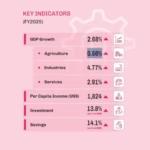 Getty Images
Getty ImagesNamrata Nangia and her husband have been toying with the idea of having another child since their five-year-old daughter was born.
But it always comes back to one question: ‘Can we afford it?’
She lives in Mumbai and works in pharmaceuticals, her husband works at a tyre company. But the costs of having one child are already overwhelming – school fees, the school bus, swimming lessons, even going to the GP is expensive.
It was different when Namrata was growing up. “We just used to go to school, nothing extracurricular, but now you have to send your kid to swimming, you have to send them to drawing, you have to see what else they can do.”
According to a new report by the United Nations Population Fund (UNFPA), the UN agency for reproductive rights, Namrata’s situation is becoming a global norm.
The agency has taken its strongest line yet on fertility decline, warning that hundreds of millions of people are not able to have the number of children they want, citing the prohibitive cost of parenthood and the lack of a suitable partner as some of the reasons.
UNFPA surveyed 14,000 people in 14 countries about their fertility intentions. One in five said they haven’t had or expect they won’t have their desired number of children.
The countries surveyed – South Korea, Thailand, Italy, Hungary, Germany, Sweden, Brazil, Mexico, US, India, Indonesia, Morocco, South Africa, and Nigeria – account for a third of the global population.
They are a mix of low, middle and high-income countries and those with low and high fertility. UNFPA surveyed young adults and those past their reproductive years.
“The world has begun an unprecedented decline in fertility rates,” says Dr Natalia Kanem, head of UNFPA.
“Most people surveyed want two or more children. Fertility rates are falling in large part because many feel unable to create the families they want. And that is the real crisis,” she says.
“Calling this a crisis, saying it’s real. That’s a shift I think,” says demographer Anna Rotkirch, who has researched fertility intentions in Europe and advises the Finnish government on population policy.
“Overall, there’s more undershooting than overshooting of fertility ideals,” she says. She has studied this at length in Europe and is interested to see it reflected at a global level.
She was also surprised by how many respondents over 50 (31%) said they had fewer children than they wanted.
The survey, which is a pilot for research in 50 countries later this year, is limited in its scope. When it comes to age groups within countries for example, the sample sizes are too small to make conclusions.
But some findings are clear.
In all countries, 39% of people said financial limitations prevented them from having a child.
The highest response was in Korea (58%), the lowest in Sweden (19%).
In total, only 12% of people cited infertility – or difficulty conceiving – as a reason for not having the number of children they wanted to. But that figure was higher in countries including Thailand (19%), the US (16%), South Africa (15%), Nigeria (14%) and India (13%).
“This is the first time that [the UN] have really gone all-out on low fertility issues,” says Prof Stuart Gietel-Basten, demographer at the Hong Kong University of Science and Technology.
Until recently the agency focused heavily on women who have more children than they wanted and the “unmet need” for contraception.
Still, the UNFPA is urging caution in response to low fertility.
“Right now, what we’re seeing is a lot of rhetoric of catastrophe, either overpopulation or shrinking population, which leads to this kind of exaggerated response, and sometimes a manipulative response,” says Dr Kanem.
“In terms of trying to get women to have more children, or fewer.”
She points out that 40 years ago China, Korea, Japan, Thailand and Turkey were all worried their populations were too high. By 2015 they wanted to boost fertility.
“We want to try as far as possible to avoid those countries enacting any kind of panicky policies,” says Prof Gietel-Basten.
“We are seeing low fertility, population ageing, population stagnation used as an excuse to implement nationalist, anti-migrant policies and gender conservative policies,” he says.
UNFPA found an even bigger barrier to children than finances was a lack of time. For Namrata in Mumbai that rings true.
She spends at least three hours a day commuting to her office and back. When she gets home she is exhausted but wants to spend time with her daughter. Her family doesn’t get much sleep.
“After a working day, obviously you have that guilt, being a mom, that you’re not spending enough time with your kid,” she says.
“So, we’re just going to focus on one.”

Get our flagship newsletter with all the headlines you need to start the day. Sign up here.










